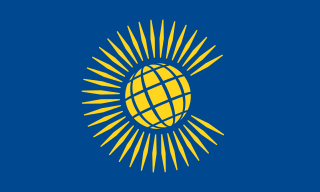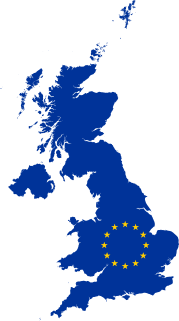Related Research Articles

The British Empire was composed of the dominions, colonies, protectorates, mandates, and other territories ruled or administered by the United Kingdom and its predecessor states. It began with the overseas possessions and trading posts established by England between the late 16th and early 18th centuries. At its height it was the largest empire in history and, for over a century, was the foremost global power. By 1913 the British Empire held sway over 412 million people, 23% of the world population at the time, and by 1925 it covered 35,000,000 km2 (13,500,000 sq mi), 24% of the Earth's total land area. As a result, its constitutional, legal, linguistic, and cultural legacy is widespread. At the peak of its power, it was described as "the empire on which the sun never sets", as the Sun was always shining on at least one of its territories.

The British Army is the principal land warfare force of the United Kingdom, a part of the British Armed Forces. As of 2020, the British Army comprises 80,040 regular full-time personnel and 30,020 reserve personnel.

England is a country that is part of the United Kingdom. It shares land borders with Wales to its west and Scotland to its north. The Irish Sea lies northwest of England and the Celtic Sea to the southwest. England is separated from continental Europe by the North Sea to the east and the English Channel to the south. The country covers five-eighths of the island of Great Britain, which lies in the North Atlantic, and includes over 100 smaller islands, such as the Isles of Scilly and the Isle of Wight.

Margaret Hilda Thatcher, Baroness Thatcher, was a British politician and stateswoman who served as Prime Minister of the United Kingdom from 1979 to 1990 and Leader of the Conservative Party from 1975 to 1990. She was the longest-serving British prime minister of the 20th century and the first woman to hold that office. A Soviet journalist dubbed her the "Iron Lady", a nickname that became associated with her uncompromising politics and leadership style. As prime minister, she implemented policies that became known as Thatcherism.

Manchester United Football Club is a professional football club based in Old Trafford, Greater Manchester, England, that competes in the Premier League, the top flight of English football. Nicknamed "the Red Devils", the club was founded as Newton Heath LYR Football Club in 1878, changed its name to Manchester United in 1902 and moved to its current stadium, Old Trafford, in 1910.

The United Kingdom of Great Britain and Northern Ireland, commonly known as the United Kingdom (UK), or Britain, is a sovereign country in north-western Europe, off the north-western coast of the European mainland. The United Kingdom includes the island of Great Britain, the north-eastern part of the island of Ireland, and many smaller islands within the British Isles. Northern Ireland shares a land border with the Republic of Ireland. Otherwise, the United Kingdom is surrounded by the Atlantic Ocean, with the North Sea to the east, the English Channel to the south and the Celtic Sea to the south-west, giving it the 12th-longest coastline in the world. The Irish Sea separates Great Britain and Ireland. The total area of the United Kingdom is 94,000 square miles (240,000 km2).
The Conservative Party, officially the Conservative and Unionist Party, and also known colloquially as the Tories, Tory Party, or simply the Conservatives, is a political party in the United Kingdom. Ideologically, the Conservatives sit on the centre-right of the political spectrum. The Conservatives have been in government since 2010 and as of 2019, hold an overall majority in the House of Commons with 365 Members of Parliament. The party also has 264 unelected members of the House of Lords, 8 members of the London Assembly, 30 members of the Scottish Parliament, 11 members of the Welsh Parliament and 7,430 local authority councillors.

The War of 1812 was a conflict fought between the United States and its allies, and the United Kingdom of Great Britain and Ireland and its dependent colonies in North America and Native American allies. It began when the United States declared war in June 1812, and ended in a restoration of the pre-war status quo when a peace treaty agreed to earlier was ratified by the United States in February 1815. Historians in the United Kingdom often see it as a minor theatre of the Napoleonic Wars, while historians in North America see it as a war in its own right. It is related to the American Indian Wars, Sixty Years' War, Creek War, Tecumseh's War, and the American Revolutionary War.

The BBC World Service is an international broadcaster owned and operated by the BBC. It is the world's largest of any kind. It broadcasts radio news, speech and discussions in more than 40 languages to many parts of the world on analogue and digital shortwave platforms, internet streaming, podcasting, satellite, DAB, FM and MW relays. In 2015, The World Service reached an average of 210 million people a week. In November 2016, the BBC announced that it would start broadcasting in additional languages including Amharic and Igbo, in its biggest expansion since the 1940s.

George V was King of the United Kingdom and the British Dominions, and Emperor of India, from 6 May 1910 until his death in 1936.

The Battle of the Somme, also known as the Somme Offensive, was a battle of the First World War fought by the armies of the British Empire and French Third Republic against the German Empire. It took place between 1 July and 18 November 1916 on both sides of the upper reaches of the River Somme in France. The battle was intended to hasten a victory for the Allies. More than three million men fought in the battle and one million men were wounded or killed, making it one of the deadliest battles in human history.

Prince Philip, Duke of Edinburgh is a member of the British royal family as the husband of Queen Elizabeth II.

The British Overseas Territories (BOTs), also known as United Kingdom Overseas Territories (UKOTs), are fourteen territories all with a constitutional and historical link with the United Kingdom. They are remnants of the British Empire and do not form part of the United Kingdom itself. Most of the permanently inhabited territories are internally self-governing, with the UK retaining responsibility for defence and foreign relations. Three are inhabited only by a transitory population of military or scientific personnel. They all have the British monarch as head of state.

The Most Excellent Order of the British Empire is a British order of chivalry, rewarding contributions to the arts and sciences, work with charitable and welfare organisations, and public service outside the civil service. It was established on 4 June 1917 by King George V and comprises five classes across both civil and military divisions, the most senior two of which make the recipient either a knight if male or dame if female. There is also the related British Empire Medal, whose recipients are affiliated with, but not members of the order.

World War I was a global war originating in Europe that lasted from 28 July 1914 to 11 November 1918. Contemporaneously known as the Great War or "the war to end all wars", it led to the mobilisation of more than 70 million military personnel, including 60 million Europeans, making it one of the largest wars in history. It is also one of the deadliest conflicts in history, with an estimated 9 million combatant deaths and 13 million civilian deaths as a direct result of the war, while resulting genocides and the related 1918 Spanish flu pandemic caused another 17–100 million deaths worldwide, including an estimated 2.64 million Spanish flu deaths in Europe and as many as 675,000 Spanish flu deaths in the United States.

Elizabeth II is Queen of the United Kingdom and 15 other Commonwealth realms.
The British Broadcasting Corporation (BBC) is a public service broadcaster, headquartered at Broadcasting House in Westminster, London. It is the world's oldest national broadcaster, and the largest broadcaster in the world by number of employees, employing over 22,000 staff in total, of whom more than 16,000 are in public sector broadcasting. The total number of BBC staff amounts to 35,402 including part-time, flexible, and fixed-contract staff.

The Commonwealth of Nations, generally known simply as the Commonwealth, is a political association of 54 member states, almost all of which are former territories of the British Empire. The chief institutions of the organisation are the Commonwealth Secretariat, which focuses on intergovernmental aspects, and the Commonwealth Foundation, which focuses on non-governmental relations between member states.

Brexit was the withdrawal of the United Kingdom (UK) from the European Union (EU) and the European Atomic Energy Community at the end of 31 January 2020 CET. To date, the UK is the first and only country formally to leave the EU, after 47 years of being a member state within the bloc, after having first joined its predecessor, the European Communities (EC), on 1 January 1973. It continued to participate in the European Union Customs Union and European Single Market during a transition period that ended on 31 December 2020 at 23:00 GMT.